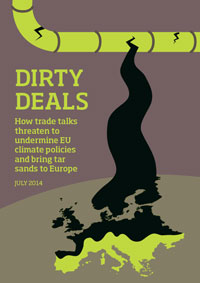| Jul 20, 2014 | |
Environmentalists claim U.S.-Europe trade deal threatens climate policy |
|
| (Nanowerk News) As the sixth round of U.S.-European Union trade negotiations in Brussels moves toward conclusion, Friends of the Earth U.S. is dismayed by the fossil fuel industry's influence on the talks, as documented in a new report. | |
 In “Dirty Deals" (pdf), Friends of the Earth Europe and other environmental groups reveal how U.S. negotiators at the Transatlantic Trade and Investment Partnership talks work to undermine the EU’s Fuel Quality Directive and unleash exports of dirty fuels, including tar sands oil, a highly intensive source of greenhouse gas emissions. The Directive is the linchpin of the EU’s program to cut greenhouse gas emissions from transport fuels. The report comes on the heels of a recently leaked document that exposed the EU’s intention to increase U.S. oil and gas exports to Europe, thus hooking Western economies for decades on high carbon energy -- a recipe for increased global warming and climate disaster. EU negotiators at TTIP talks want the U.S. to scrap its current legal prohibition on crude oil exports and its licensing restrictions on natural gas exports. Bill Waren, Senior trade analyst at Friends of the Earth U.S., had this to say about the past week’s TTIP negotiations in Brussels: The report documents that the U.S. is working hand in glove with Big Oil to weaken the Directive and delay its implementation. The influence of Big Oil on U.S.-Europe trade talks highlights the breach of public trust in the whole process. Negotiations are held behind closed doors and key documents are kept secret; yet multinational corporations and Wall Street insiders have special access as cleared advisors of the U.S. Trade Representative. TTIP would entrench corporate power and stand in the way of bold government action required to avoid climate catastrophe. It is clear that the aim of negotiators is to both ensure dependence on oil and gas exports and undercut responsible climate policy on both sides of the Atlantic. |
| Source: Friends of the Earth |
